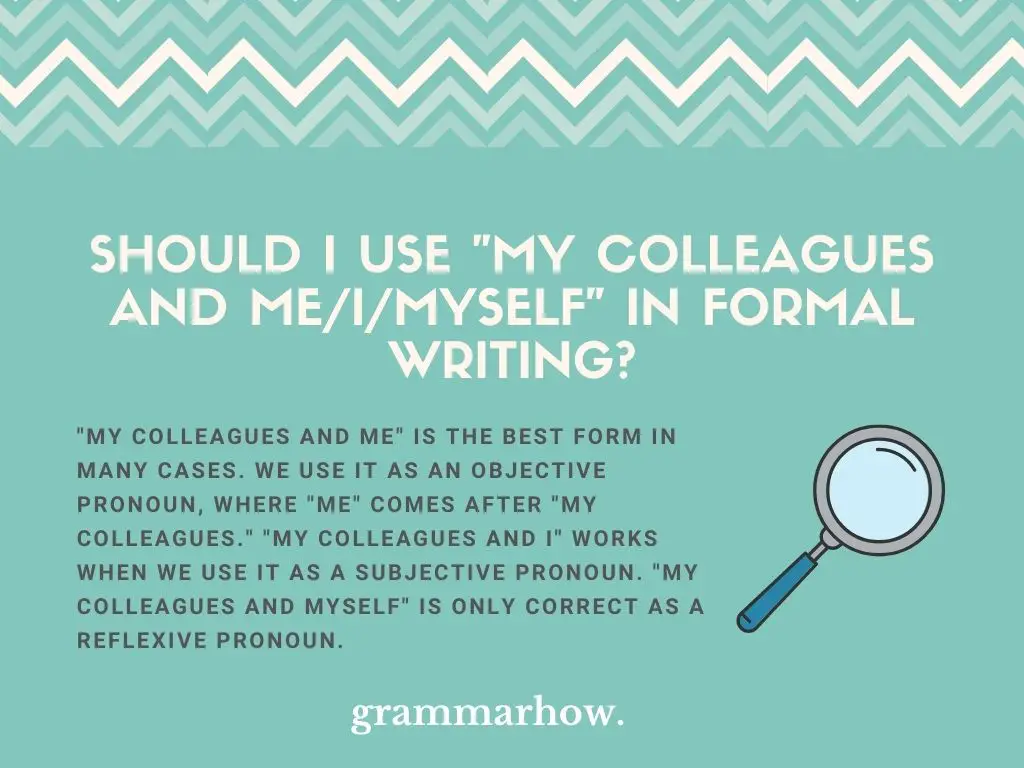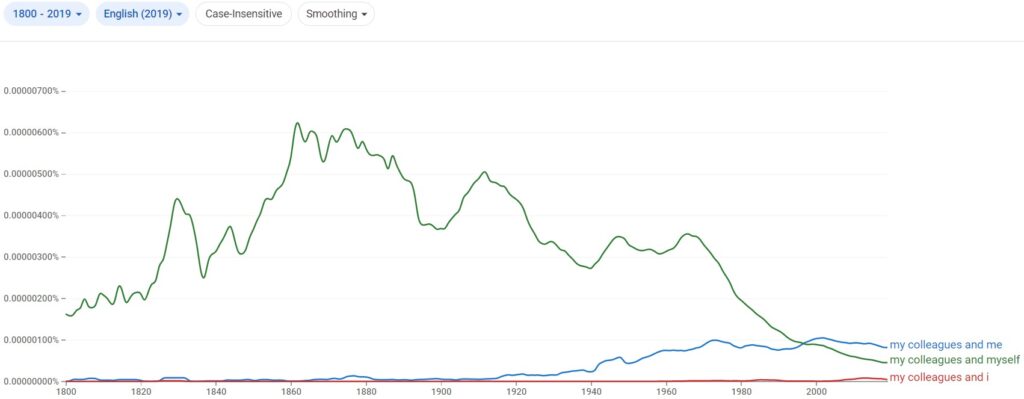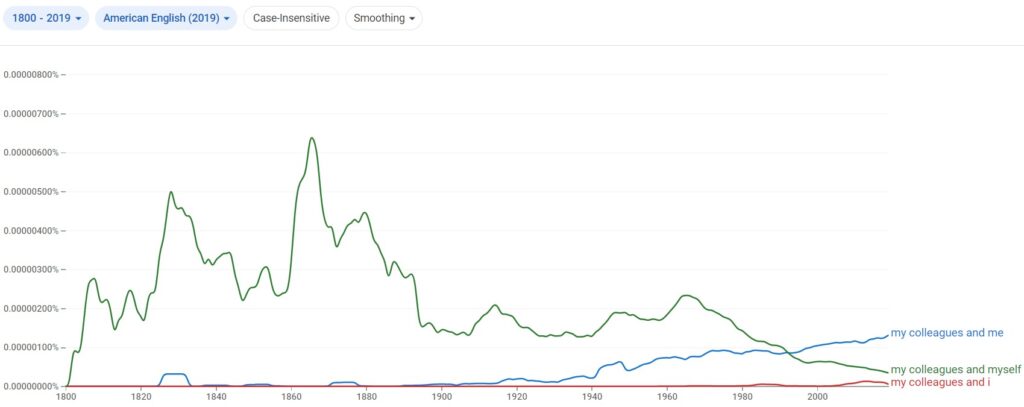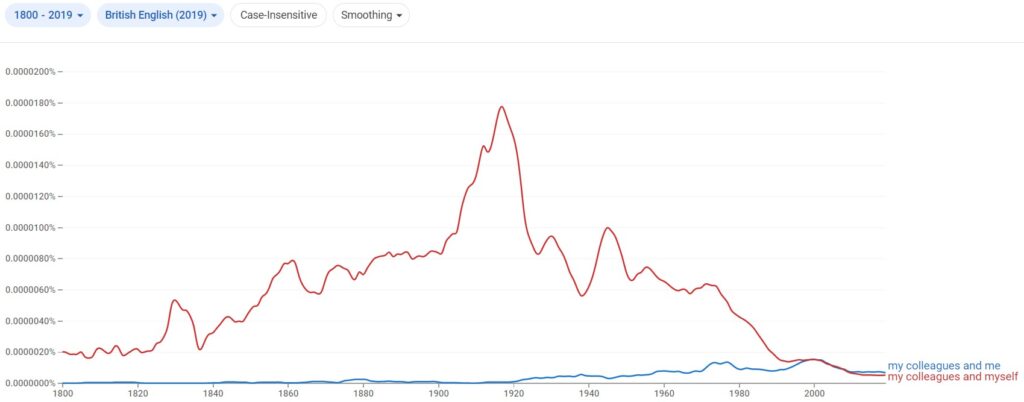When using phrases like “my colleagues and me,” it would help to know whether “me,” “I,” or “myself” should accompany the phrase. This article will explore the answer for you and let you know when they work.
Should I Use “My Colleagues And Me/I/Myself” In Formal Writing?
“My colleagues and me” is the best form in many cases. We use it as an objective pronoun, where “me” comes after “my colleagues.” “My colleagues and I” works when we use it as a subjective pronoun. “My colleagues and myself” is only correct as a reflexive pronoun.

There is a simple way to help you remember which one works best. If you remove “my colleagues and” from the sentence, you’ll know whether or not you’ve got the correct pronoun choice.
Here are some examples to explain what we mean:
- This new policy directly applies to my colleagues and me.
- This new policy directly applies to me.
- My colleagues and I would like to have a discussion with you about these wages.
- I would like to have a discussion with you about these wages.
- I did this to my colleagues and myself.
- I did this to myself.
As you can see, if we remove “my colleagues and” and the sentence still makes sense, we know we are using the correct pronoun.
When Should I Use “My Colleagues And Me”?
Let’s start with the most obvious choice of the three. It’s much more likely that we’ll come across this in the objective form, so we’ll start with “my colleagues and me.”
“My colleagues and me” works best when you are writing objectively. It usually comes toward the end of a sentence where something has been presented that might affect “my colleagues and me.”
Remember, we can remove “my colleagues and” at any point, and the sentence should still hold the same meaning.
Here are some examples to help you with it:
- I didn’t think he would say any of that stuff to my colleagues and me.
- The boss spoke clearly to my colleagues and me, but we still didn’t understand why he said any of it.
- You have a few new policies in place that have changed the jobs of my colleagues and me.
- It directly affected my colleagues and me, which is why we wanted to have a quick word with him about it.
- You have disrespected my colleagues and me. I think it’s time for you to apologize.
When Should I Use “My Colleagues And I”?
“My colleagues and I” is the subjective form. We can use this form when it’s presented at the start of a sentence. It’s usually directly followed by a verb to show how “my colleagues and I” interact with the sentence based on action choices.
These examples should help you figure it out:
- My colleagues and I would like to discuss the future development plans. We don’t agree with them.
- My colleagues and I knew there was more to the story, but the boss wasn’t giving anything away.
- My colleagues and I thought we had it under control, but the project went south pretty quickly.
- My colleagues and I had to host a few interviews for the new recruits, but none of us knew what we were doing.
- My colleagues and I wanted to go home. The boss made us stay for way longer than should be allowed.
When Should I Use “My Colleagues And Myself”?
“My colleagues and myself” is only correct as a reflexive pronoun form. This is not common in English, as reflexive pronouns usually refer to a single person or group. “My colleagues” is one group, while “myself” is another, so it’s not always appropriate.
Some native speakers will use “my colleagues and myself” synonymously with “my colleagues and me.” They believe that they are synonymous phrases because they both use a similar “me” or “myself” structure.
However, if you want to be grammatically correct, you’ve got to ensure you use the reflexive pronoun correctly.
Here’s how it works:
- That’s a picture of my colleagues and myself.
- I did some bad things to my colleagues and myself.
- I found it hard for my colleagues and myself.
Reflexive pronouns work best when “I” has already been mentioned.
Is “My Colleagues And Me /I/Myself” Used The Most?
It might help to look at some statistics to see which of the three phrases is the most common.
According to Google Ngram Viewer, “my colleagues and me” is the most popular choice. Apparently, “my colleagues and myself” is the next most popular, but this is most likely due to a grammatical error that a lot of native speakers ignore.

In reality, “my colleagues and I” has a lot more contextual meaning than “my colleagues and myself.” It should be that “my colleagues and I” was higher up the graph and much closer to “my colleagues and me.”
Is “My Colleagues And Me /I/Myself” Used Differently In The UK And The US?
We can take the statistics further and look at how the UK and the US handle the different phrases.
According to Google Ngram Viewer, “my colleagues and me” is still the most popular choice in American English. “Myself” is the next best option, and again “I” seems to be at the bottom.

Weirdly, according to Google Ngram Viewer, “my colleagues and I” doesn’t even exist in British English writing. “My colleagues and me” is the most popular choice again, but “I” isn’t even mentioned.

“My colleagues and I” doesn’t seem popular at all in British English, while it is barely used in American English. This shows that even native speakers can make grammatical mistakes since “my colleagues and myself” shouldn’t see that much usage.
Is It Ever Correct To Use “Me/I/Myself And My Colleagues”?
It is never correct to place the pronoun before the noun. “Me and my colleagues” is incorrect because English rules teach us that it’s formal and polite to place the group noun (my colleagues) before any other pronouns. Only “My colleagues and me” is the correct ordering.
You may also like:
Is It “John And I”, “John And Me”, or “Me And John”?
“Me And My Family” or “My Family And I”? Correct Version
“You And I” Or “You And Me”? Here’s The Correct Spelling (+18 Examples)
“Me And Someone” Or “Someone And I”: Which Is Correct? (12 Examples)
“My Wife And I” vs. “My Wife And Me” vs. “Me And My Wife”
“My Father And I” or “My Father And Me” – Correct Version
“My Mom And I” vs. “My Mom And Me” vs. “Me And My Mom”
